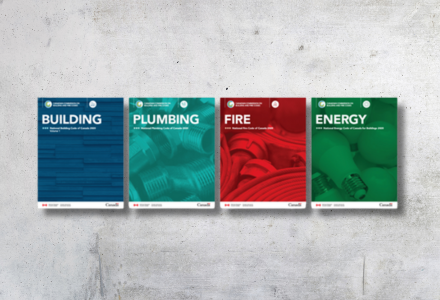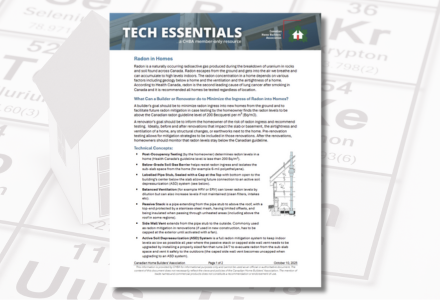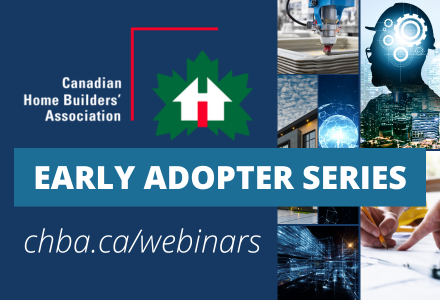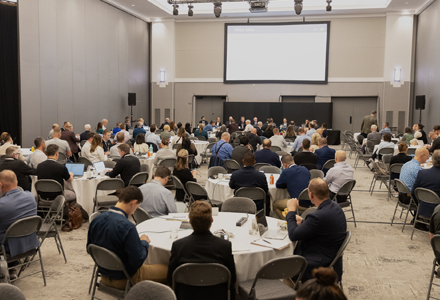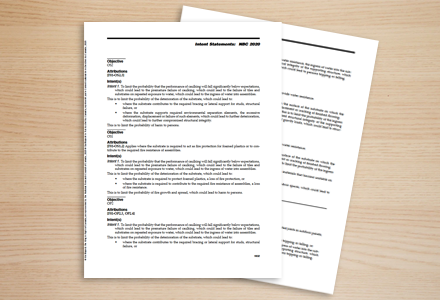Welcome to Housing Tech News
This e-publication is exclusive CHBA Member content, providing you with updates on the efforts of the CHBA Technical Research Committee, including information on technical research, changes to code and standards, and related events and communications. If there is a colleague in your company or a fellow CHBA member who should be receiving this content, we'd like to help you share it. However, don't just forward this email—that allows other people to unsubscribe you. Instead, please email us with the person's name, company name, and email address and we'll create an account for them and then let them know.
|
In this issue:
- Embedding Affordability in Canada’s National Building Codes: A Strategic Initiative by CHBA
- Tech Essential Spotlight: Radon Awareness and Code Updates
- Early Adopter Webinar Series | Webinar #3 Coming Soon: Mass Timber | November 27
- Shaping the Future: Technical Topics at Fall Meetings in Ottawa
- How to Get Involved and Stay Up-to-Date with National Codes
- 2020 National Code Intent Statements published
- New Articles for further reading
|
Embedding Affordability in Canada’s National Building Codes: A Strategic Initiative by CHBA
CHBA is leading a breakout group on ‘Affordability in National Codes’ under the Advisory Council on Harmonized Construction Codes (ACHCC). The group is driving efforts to embed affordability into Canada’s National Model Codes—an essential step toward making homes more attainable for Canadians. CHBA is championing changes to the national code development process that ensure new building regulations truly consider affordability implications. The group will propose key principles like cost-neutrality and introduce the concept of an affordability limit for each code cycle, and will recommend a requirement that the benefits of code changes have to outweigh their costs. They’re also advocating for more accountability for committees when describing the impact of future code changes. The ultimate goal of the recommendations is to establish affordability as a formal objective in the codes that shapes how homes are built. The next step will be to present the recommendations to the Advisory Council on Harmonized Construction Codes and to invite its members to provide feedback before the group continues refining its recommendations. For additional information, email Frank Lohmann.
|
Tech Essential Spotlight: Radon Awareness and Code Updates
CHBA has recently published a Tech Essential for Radon in Homes that explains the basic concepts builders and renovators need to know when it comes to the construction of new homes or the renovation of existing homes. The two-pager highlights key requirements in the 2025 National Building Code and a link to the 2024 Cross-Canada Radon Survey. It also provides links to updated radon mitigation standards available for free from the Canadian General Standards Board, and other resources available from Health Canada, Canadian National Radon Proficiency Program (C-NRPP), the National Research Council and CHBA’s Renovators Manual. CHBA continues to actively participate in codes and standards and advocate for technical requirements that can be easily applied by builders once the provinces and territories adopt the 2025 National Building Code, including simple radon mitigation options in addition to the “passive stack.” A Radon Task Group set up under the new codes’ system is currently working on a proposed change that would allow active mitigation systems to be installed without having to apply for an alternative solution. If approved by the Canadian Board for Harmonized Construction Codes, this change could be adopted by the provinces and territories when they implement the 2025 radon requirements in their codes. If you have any questions or if you would like to get involved in the codes work around radon, please email Jack Mantyla.
|
Early Adopter Webinar Series
WEBINAR #3 COMING SOON: Mass Timber | November 27 @ 12:30 PM ET
CHBA’s Early Adopter Webinar Series showcases best-practice solutions and emerging technologies ahead of future code changes. Each session features an expert who explains the best practice solution, followed by a builder or renovator—the “early adopter”—who has voluntarily implemented it in their projects. They share practical insights on what worked, what didn’t, and how they have arrived at cost-effective solutions. The goal of the series is to inspire confidence in CHBA members to adopt new building approaches or innovative technologies, and to demonstrate achievable solutions that go beyond minimum standards. Past episodes have explored integrating climate resilience into homes using new design tools and improving suite acoustics to enhance occupant comfort and sound performance in multi-unit buildings.
The next webinar will focus on mass timber construction, examining its role in next-generation housing. The Canadian Wood Council will explain the basic concept of how mass timber construction works, and Naikoon Construction will highlight their projects spanning from commercial to multi-unit residential. While mass timber construction is mostly cost-effective for larger buildings, the webinar will also discuss some applications for single family homes. Contact Alex Bols for more information – registration coming soon!
|
Shaping the Future: Technical Topics at Fall Meetings in Ottawa
On the afternoon of Monday, October 20, the Net Zero Council meeting agenda includes presentations and panel discussions that will explore the opportunity for CHBA to create a program for Resilient Homes. The Technical Research Committee will meet on Tuesday, October 21st, moving through a dynamic agenda packed with critical updates and collaborative opportunities. From affordability in national codes to working with CMHC, NRC, NRCan and Health Canada on the latest housing research, the meeting is designed to spark meaningful dialogue and drive innovation. Members will participate in a roundtable discussion with provincial TRC representatives on CHBA’s idea of creating a National Building Code Interpretation Centre. Members will also engage on the new concept of ‘Accessibility-Ready Design’ and the newest code changes on adaptability and visitability. With dedicated Q&A sessions, and ample opportunity to network, these meetings give members from coast to coast an opportunity to connect, contribute, and help find solutions to technical challenges faced by members.
|
How to Get Involved and Stay Up-to-Date with National Codes
The work for the 2030 National Building Codes is well underway. It includes 13 new National Model Code Committees (NMCC) and over 50 new Task Groups (TG), which CHBA staff attend regularly either as a member or observer. Due to the inordinate number of code meetings, CHBA has devised a strategy to prioritize the 50+ Task Groups. Significant priorities include subjects like housing supply, harmonization, climate change adaptation, embodied carbon, more renovation requirements, accessible dwellings, radon and energy efficiency. Once CHBA staff have attended a code meeting, they post their summary of the meeting to the Member Knowledge Centre under the “Building Code Meeting Brief” category. This is a valuable resource for members to stay informed about the latest developments in the rapidly evolving code cycle. Additionally, CHBA staff send out a bi-weekly email highlighting important code meetings. The email contains the date and time when meetings will be held and includes information on how to attend, why a member should attend and which CHBA tech staff to contact for each meeting. Please click here to manage your e-newsletter subscriptions and sign up for the bi-weekly Code Meeting Notification email. For additional information, email Alex Bols.
|
2020 National Code Intent Statements published
Since 2010, the National Model Construction Codes have been structured using an objective-based format. This format includes clearly defined objectives and functional statements that outline how building components are expected to perform (functions) and what the code is trying to avoid (objectives). They are published in the codes and form an integral part of the objective-based concept. Another important element of the objective-based codes are the intent statements, which offer additional context and insight into the rationale behind each requirement, making them a valuable resource for code users – especially when considering alternative solutions. Members and CHBA staff participating in the code development system will occasionally review intents, functional statements and objectives, for example when discussing climate resilience and having to decide, whether a climate resilience measures is there to avoid the collapse of the building (high wind) or to keep occupants safe (overheating), which would have very different objective-based information. Members can now download the intent statements for the 2020 National Building Code, along with supplements, other codes and guides here at no cost. Members are encouraged to consult these intent statements, especially when preparing applications for alternative solutions. Click here to download the PDF versions of the intent statements. For further information, please email Jack Mantyla.
|
News Articles
This section includes articles that you might find interesting. They do not necessarily reflect the views or opinions of CHBA.
|
The Canadian Home Builders' Association
141 Laurier Avenue West, Suite 500
Ottawa, ON K1P 5J3
communications@chba.ca
|
|

